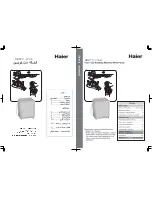
For Service Technician Use Only
COMPONENT TESTING (Cont.)
3-8
n
Whirlpool
®
and KitchenAid
®
Filtration and Maytag
®
24" Microfiltration Dishwashers
General Theory of Operation
Refer to Wiring Diagram on page
.
Neutral and L1 (AC voltage) enters the Control Board at P4,
pins 4 and 1 respectively. AC is converted to DC voltage at the
Low Volts Power Supply (LVPS). Supplies include 13 VDC and
5 VDC, and DC GND (REF). These low voltage supplies are used to
provide power to the microprocessors and board components,
control the TRIAC, power the sensors, user interface, buzzer, fan
motor, and energize the AC relays.
The 13 VDC is vital to the operation of the dishwasher.
This supply is necessary to operate all 120 VAC loads in the
dishwasher, whether they are connected to a relay or controlled
by TRIAC. 13 VDC is generated by the power supply and flows
through the door switch-when closed-to be available to the
heater relays (L1 and N), wash motor relay, and the pilot relay.
A relay coil becomes energized when the control closes
the LV drive circuit for a specific relay completing 13 V pathway,
which in turn closes the relay switch providing AC to the load.
The Pilot relay provides "L1" to the remainder of the components
that are controlled by the Neutral-sensed TRIAC.
In the micro-filtration dishwasher, there are 2 or 3 fuses on the
Control Board: F500 Small TRIAC Load Fuse, F101 Main Power
Supply Fuse, and F501 Wash Motor Fuse. If the TRIAC Fuse is
open, all loads controlled by TRIAC will not operate. If the Main
Power Supply Fuse is open, no 5 V or 13 V supply will be available
and the unit will appear to not power up. If the Wash Motor Fuse
(optional) is open, all loads will work except the wash motor.
NOTE:
Refer to "Fuse Service and Diagnostic Checks" on page
Power Check
This test checks for incoming and outgoing power to and from
the control board. This test assumes that proper voltages is
present at the outlet or direct connect cable.
Test Procedure
1.
Unplug dishwasher or disconnect power.
2.
Remove access panel.
3.
Remove terminal box cover.
4.
With a voltmeter set to AC, place black probe on white
terminal block screw head (N) and red probe on black
terminal block screw head (L1).
5.
Plug in dishwasher or reconnect power.
¾
If 120 VAC is present, unplug dishwasher or disconnect
power and proceed to step 6.
¾
If 120 VAC is not present, have customer correct power.
6.
Remove the outer door panel to access the control board.
7.
Remove cover from control board and locate connector P4.
8.
With a voltmeter set to AC, connect black probe to P4,
pin 4 (N) and red probe to P4, pin 1 (L1).
9.
Plug in dishwasher or reconnect power.
¾
If 120 VAC is present, go to step 10.
¾
If 120 VAC is not present, check for open connection
between terminal block and control. Repair as needed.
10.
Verify DC Supplies.
•
5 VDC is used to power IC's and micro-processors on the
circuit board as well as provide power to the sensors.
¾
If 5 VDC were missing, the OWI (Optical Water Indicator)
and user interface would not function. To verify 5 V ± 5%,
with a voltmeter set to DC, connect the black lead to
P10-2 (DC GND) and the red lead to P11A-2 or P11B-2
(5 V).
•
13 VDC is used to actuate the 120 VAC relays and TRIAC on
the control, the overfill switch input, and the LEDs on models
with interior lighting.
¾
If 13 VDC was missing, the heater, motors, and all the
other loads would not turn on as well as the LEDs on
models with interior lighting. The control would falsely
detect an overfill fault. To verify 13 V ± 5%, with a
voltmeter set to DC, connect the black lead to P10-2
(DC GND) and the red lead to P11-7 (13 V).
Troubleshooting Missing DC Supplies:
Refer to the Wiring
Diagram on page
when troubleshooting the DC supplies. If
5 VDC or 13 VDC is missing on the control, unplug dishwasher
or disconnect power, and then disconnect all components/
loads from the control relying on the missing or loaded
supply. Plug in dishwasher or reconnect power and check if
the DC supply has returned.
¾
If not, replace the control.
¾
If it has, turn off dishwasher and reconnect one connector
at a time until the component loading down that supply
has been identified.
11.
Unplug dishwasher or disconnect power.
12.
Reassemble all parts and panels.
DANGER
Electrical Shock Hazard
Only authorized technicians should perform
diagnostic voltage measurements.
After performing voltage measurements,
disconnect power before servicing.
Failure to follow these instructions can result in
death or electrical shock.
















































